Dentures Granby
Get a New and Improved Smile Fast

Wish your smile were complete? Tired of having to make compromises to your diet? Want to start feeling confident about your smile again? Today is the day you should consider dentures in Granby at Salmon Brook Dental! When you don’t have a smile you feel comfortable showing off, it can take a major toll on your self-esteem. Our amazing team of dentists want to help you change that moving forward. To get started planning your future smile transformation with dentures, give their office a call today and schedule an appointment!
Why Choose Salmon Brook Dental for Dentures?
- Highly Customized with Natural-Looking Dental Materials
- Affordable Options and Dental Financing Offered
- Implant Dentures Available for Improved Longevity and Dental Health
Who’s a Good Candidate for Dentures?
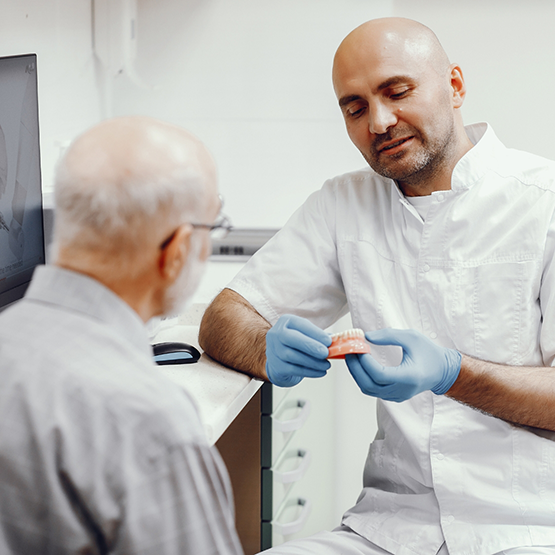
Whether you are missing several teeth or all of your teeth, pretty much anyone can get dentures. To get started you need to schedule a consultation with your dentist so they can determine whether or not you are eligible for this treatment. Even if you don’t make a good candidate right away, dentures could still be in your future if you restore the health of the gum tissue and bone structure.
Effects of Missing Teeth
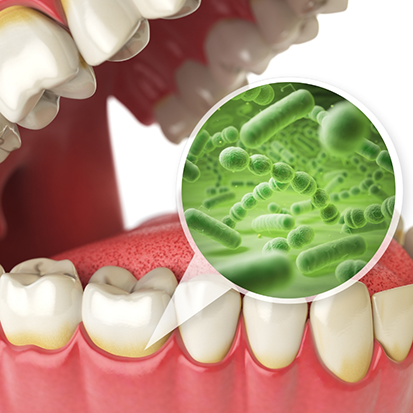
The most common causes of missing teeth include tooth decay, gum disease, and injury. This can lead to a variety of negative consequences. According to the American Academy of Periodontology, people who are missing teeth could be looking at facial sagging, difficulty speaking, trouble eating, and lower self-esteem. When you replace your missing teeth with dentures, you can see improvement in all of these different areas of your life.
What Qualifies You for Dentures?
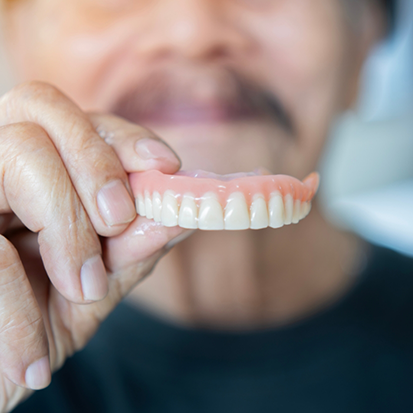
Dentures are an excellent solution for patients who have experienced significant tooth loss and have sufficient, healthy gum tissue and jawbone. People who get dentures also need to be committed to their dental health routine and willing to properly care for their dentures.
The number of teeth you are missing and where they are located in your mouth will ultimately determine which type of denture is best for you. Dentures are more affordable when compared to other tooth replacement options, making them ideal for patients who are unable to invest a lot of money in their smile at this time.
Alternative Tooth-Replacement Options
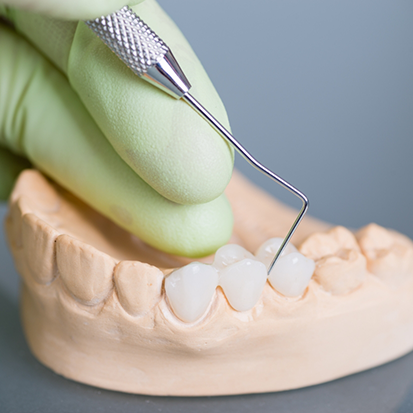
Patients who don’t make a good candidate for dentures may be a good candidate for other tooth replacement options:
- Dental Bridges: Dental bridges are ideal for patients who are only missing one or a few teeth. A bridge requires healthy teeth surrounding the missing tooth to support it.
- Dental Implants: Since a titanium post is inserted into the jawbone, patients need to have a solid bone structure to get dental implants. This option is more costly than dentures, but it’s permanent.
What Is a Full Denture?
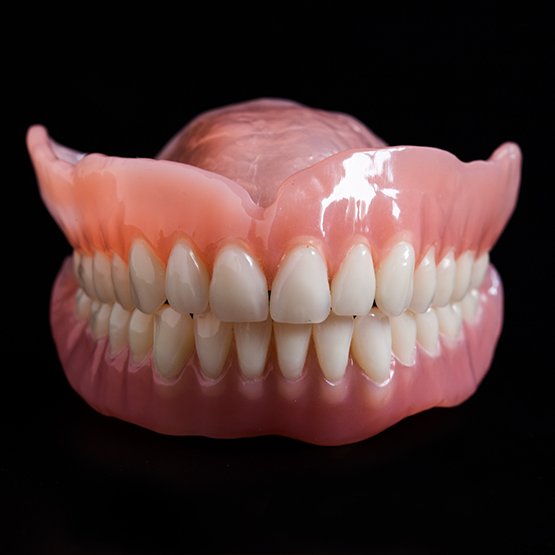
Are you missing an entire row of teeth? Whether you don’t have any remaining teeth in your top or bottom arch, a full denture is likely the best solution for you. This denture is custom-made from either ceramic or acrylic restorations which are then placed inside of a gum-colored base. This base is designed to match your existing gum tissue as closely as possible.
To create a full denture, we start by capturing dental impressions of your mouth, which is then sent to an offsite dental lab of trusted technicians our office partners with. Your impression mold is then used to design and fabricate your future prosthesis. After it is created, you’ll come back to our office to have it fitted. We’ll go over the steps to wearing and cleaning the denture as well as products that can help make this process as smooth as possible.
What Is a Partial Denture?
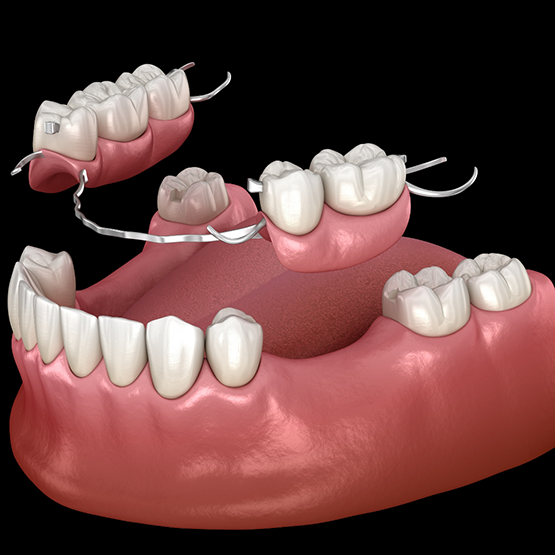
Partial dentures are a bit different in a few unique ways. For starters, they are only meant to fill the gaps in either your top or bottom arch, much like how a puzzle piece fits into a larger puzzle. This effectively prevents neighboring teeth from shifting out of place and making your smile and bite uneven. While they are also made from ceramic and acrylic materials to ensure natural-looking esthetics, they use metal clasps that wrap around teeth to stay in place rather than solely rely on natural suction to the gums.
How Dentures Are Made
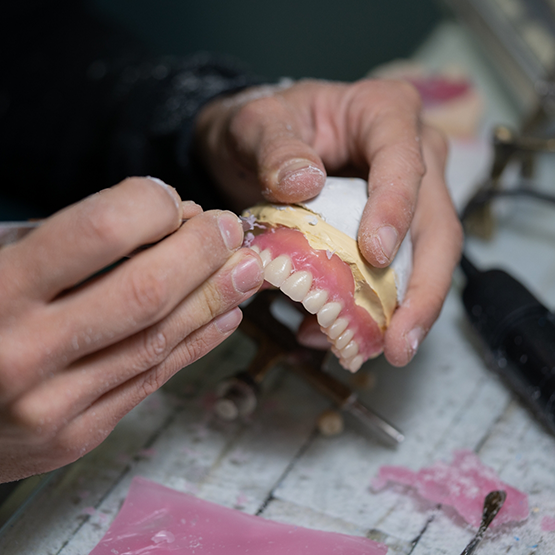
If you’re considering dentures to replace your missing teeth, you may be wondering what the denture creation process looks like. After all, the prosthesis is made just for you! Everyone’s smile is different, and so is the treatment process. However, this is what you can usually expect.
What Are Dentures Made Of?
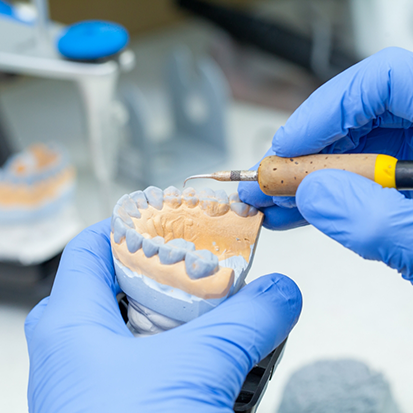
Dentures are composed of two different parts: the base and the replacement teeth. Here is what each part generally consists of:
- Denture Base: This is the structure that holds your replacement teeth. It is crafted to fit your mouth perfectly and look like natural gum tissues. It can be made from a variety of materials, like acrylic, nylon, porcelain, resin, or even metal. Full dentures are usually made using acrylic because it can be tailored to match your natural gum tissue. Partial dentures may use metal clips with an acrylic base.
- Replacement Teeth: The teeth that are supported by the base are usually made from resin or porcelain. Both of these materials have a natural appearance. However, porcelain is more popular because it looks and feels just like a natural tooth. It is also very durable. Typically, porcelain is only recommended for full dentures because it can be abrasive on the adjacent teeth.
The Denture Creation Process
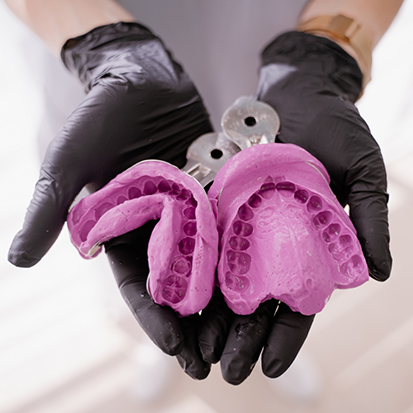
Every denture is custom-made for the patient’s mouth, so it requires a multi-step process to ensure that everything fits perfectly. Here’s what the step-by-step process usually looks like:
- Your dentist will take impressions of your upper and lower gumline. Measurements of your jaw will also be taken. This will be used to create a plaster model that will be a replica of your mouth. The model is used to make sure the final denture is the perfect size and shape to fit your mouth.
- The cast is sent off to the dental lab where your dentures will be made. At the lab, they will create the wax replica of your gumline.
- Artificial teeth are set in place. Using an articulator, the teeth are attached with wax. The technician will make minor adjustments by shaping and carving the wax so that it looks just like your gums.
- Your wax dentures are sent back to your dentist for a fitting. If everything looks good, the dentures are sent back to the dental lab to complete the process.
- Once back in the lab, the technician will boil the dentures to get rid of the wax portions. To do this, the dentures are placed in a holding device known as a “flask.” Plaster is poured in to maintain the shape of the dentures. Then the entire flask is placed into hot water to melt away the wax portions of the dentures.
- Holes are made in the teeth, then acrylic is injected into the flask to replace the wax.
- The plaster is carefully removed with lab tools to reveal the final denture. The denture is placed into an ultrasonic bath to remove any remaining plaster.
- Excess acrylic is cut off, then the denture is polished.
- Lastly, you will be able to return to the dental office for a fitting. Adjustments can be made as needed to ensure that you will be happy with your new smile!
Learn More About All-on-4 Dentures
Adjusting to Your New Dentures

Minor discomfort after first getting dentures is normal. Initially, many patients experience mild soreness and have difficulty speaking and eating comfortably. With a little bit of time, your mouth will adjust to the denture, and it will feel similar to natural teeth. By sticking to soft foods, exercising your facial muscles, experimenting with adhesive, and practicing difficult-to-pronounce words, you can speed up the adjustment period. If you have any concerns or questions regarding your replacement teeth, don’t hesitate to reach out to us.
The Benefits of Dentures

When teeth are missing, it quickly becomes obvious just how much of a negative impact an incomplete smile can have on your everyday life. In particular, tasks such as chewing your food and speaking clearly will suddenly become much more difficult. But if you replace your missing teeth with high-quality dentures, it won’t be long before your life starts to change for the better! Here’s a closer look at some of the many benefits that dentures have to offer.
Psychological Benefits

It may not be immediately obvious, but missing teeth can take a toll on your mental well-being. Constantly worrying about the embarrassing gaps in your smile can leave you feeling anxious in social situations. On top of that, some people even experience symptoms of depression. Fortunately, getting dentures can go a long way toward helping you feel better about yourself. Having a complete, functional smile again can improve your self-esteem and let you feel surer of yourself when interacting with others.
Clearer Enunciation

When speaking, there are several sounds that are difficult to make without teeth. As such, extensive tooth loss can hurt your ability to speak in a way that others can clearly understand. Dentures can fulfil the same roles as your natural teeth during speech, thus making proper enunciation easier. Once you’ve had the chance to adjust to your dentures, it won’t be long before you’re speaking to others with confidence again.
Improves Nutrition

Without a full set of teeth, your ability to get good nutrition is likely to suffer simply because you aren’t able to eat as many different kinds of foods. Dentures make it possible to once again enjoy a wider array of vegetables, fruits, and other foods that can go a long way toward helping you maintain a healthy body. On top of that, dentures allow you to chew your food more thoroughly, which is essential for avoiding digestive problems.
Preserves Oral Health

A partial denture can help you protect the teeth that you still have in a number of ways. For example, empty space in your smile can cause your remaining teeth to drift out of their proper alignment; partial dentures can stop this from happening. Furthermore, the prosthesis will help ensure that the forces associated with chewing are distributed properly throughout the mouth so that your teeth aren’t exposed to more pressure than necessary.
Expands Opportunities

A great smile can open a lot of doors in your professional and personal lives. Filling in the empty space in your mouth with dentures can help you make a significantly better first impression during job interviews, first dates, and more. On top of that, a confident, complete smile can go a long way toward helping you come off as more trustworthy and approachable in general, which can ultimately have a positive effect on your career.
Denture FAQs
What can’t you eat with dentures?
One of the things most people who get dentures worry about is what they’ll be able to eat. Once you’re used to it, your prosthetic will afford you a much stronger bite than you could get without them, but here are a few things that may be challenging to eat with your dentures.
- Sticky, gummy foods that could potentially pull your dentures out of place. This includes peanut butter, gummy candy, etc.
- Foods that easily break into pieces, like nuts and popcorn. These shards can potentially get stuck under your dentures, irritating your gums.
- Harder foods, like carrots and apples, should be okay to eat occasionally. Overdoing it, however, could potentially put an undue amount of pressure on your gums. Similarly, tougher meats can also put a fair amount of stress on your prosthetic.
What do I do if my dentures don’t fit properly?
When you first get your dentures from us, they’ll be meticulously tailored to fit your mouth. However, it’s common for people with dentures to have their jaw shrink over time. If your dentures start to feel a little bit loose, or if you notice yourself being overly reliant on dental adhesive, this may be the case for you.
In that case, we can reline your dentures for you. A soft reline involves adding an additional layer of padding to your dentures so they fit and can be done within a single visit. Hard relines are more extensive, but they’d require us to send your prosthetic to a separate lab in order to do it. If your dentures don’t fit, talk to us and we’ll be able to help you.
Can I use regular toothpaste to clean my dentures?
It’s important to brush and rinse off your dentures every day in order to prevent plaque buildup. However, it’s usually a good idea not to use toothpaste when you do this.
That’s because dentures are made of acrylic, which is substantially softer than your natural enamel. Toothpaste tends to contain mild abrasives that are perfectly fine for your teeth, but they’ll leave small scratches on your dentures that can become a host for bacteria. For this reason, it’s also a good idea to use soft-bristled toothbrushes as opposed to those with harder bristles.
In lieu of toothpaste, you should use specialized denture cleaners. You could also use mild dishwashing detergent in a pinch.
Can I sleep with my dentures?
We strongly recommend against wearing your dentures to bed. Your gums need time to rest, and if you don’t give that to them, you could start to develop denture sores. It’s also possible that leaving your dentures in could create a nest of bacterial infection under your prosthetic.
We would usually tell you to wear your dentures for a full 24 hours when you first get them, but after that, you need to leave your dentures in a soaking solution overnight to disinfect them.
